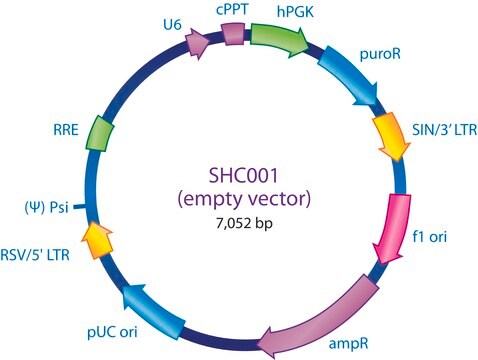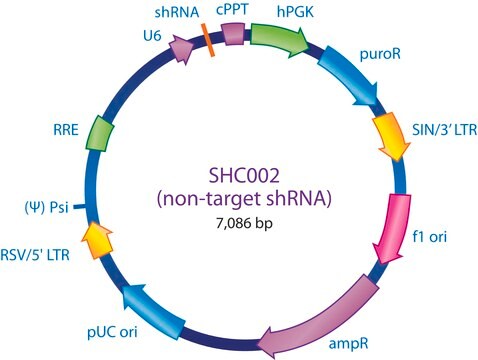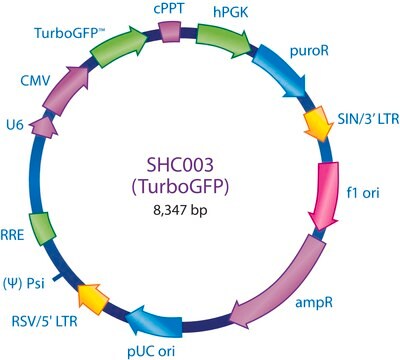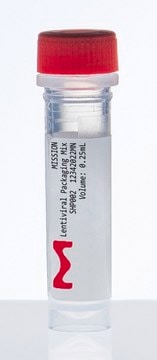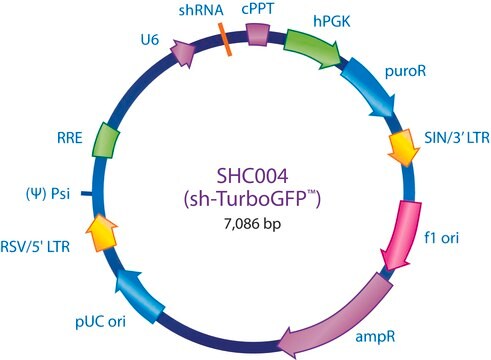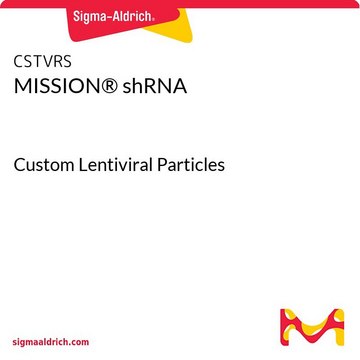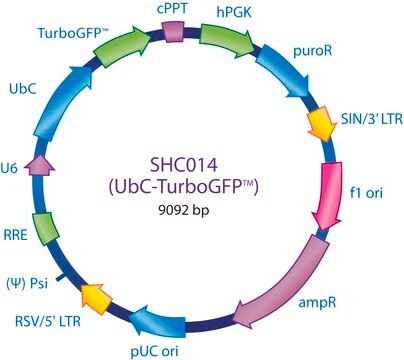SHC007
MISSION® pLKO.1-puro Luciferase shRNA Control Plasmid DNA
shRNA sequence targeting luciferase
Synonym(s):
MISSION® Control Vectors
Sign Into View Organizational & Contract Pricing
All Photos(1)
About This Item
Recommended Products
Quality Level
product line
MISSION®
concentration
500 ng/μL in TE buffer; DNA (10μg of plasmid DNA)
shipped in
dry ice
storage temp.
−20°C
Looking for similar products? Visit Product Comparison Guide
General description
The MISSION® Luciferase shRNA Control Vector is a 7,091 base pair lentivirus plasmid vector that contains an shRNA sequence targeting luciferase from Photinus pyralis (GenBank Accession No. M15077). The Luciferase shRNA Control Vector is useful as a positive knockdown control in experiments using cell lines expressing firefly luciferase. It can also be used as a negative control vector.
Ampicillin and puromycin antibiotic resistance genes provide selection in bacterial or mammalian cells respectively. In addition, self-inactivating replication incompetent viral particles can be produced in packaging cells (HEK293T) by co-transfection with compatible packaging plasmids, MISSION® Lentiviral Packaging Mix (Prod. No. SHP001). The Luciferase shRNA Control Vector is provided as 10 μg of plasmid DNA in Tris-EDTA (TE) buffer at a concentration of 500 ng/μl.
Ampicillin and puromycin antibiotic resistance genes provide selection in bacterial or mammalian cells respectively. In addition, self-inactivating replication incompetent viral particles can be produced in packaging cells (HEK293T) by co-transfection with compatible packaging plasmids, MISSION® Lentiviral Packaging Mix (Prod. No. SHP001). The Luciferase shRNA Control Vector is provided as 10 μg of plasmid DNA in Tris-EDTA (TE) buffer at a concentration of 500 ng/μl.
Application
To see more application data, protocols, vector maps visit sigma.com/shrna.
Legal Information
Use of this product is subject to one or more license agreements. For details, please see http://sigmaaldrich.com/missionlicense.
MISSION is a registered trademark of Merck KGaA, Darmstadt, Germany
recommended
Storage Class Code
10 - Combustible liquids
WGK
WGK 3
Flash Point(F)
Not applicable
Flash Point(C)
Not applicable
Choose from one of the most recent versions:
Certificates of Analysis (COA)
Lot/Batch Number
Sorry, we don't have COAs for this product available online at this time.
If you need assistance, please contact Customer Support.
Already Own This Product?
Find documentation for the products that you have recently purchased in the Document Library.
Customers Also Viewed
Islands of spatially discordant APD alternans underlie arrhythmogenesis by promoting electrotonic dyssynchrony in models of fibrotic rat ventricular myocardium.
Majumder R
Scientific Reports, 6 (2016)
Ivana Horvathova et al.
Molecular cell, 68(3), 615-625 (2017-10-24)
RNA degradation plays a fundamental role in regulating gene expression. In order to characterize the spatiotemporal dynamics of RNA turnover in single cells, we developed a fluorescent biosensor based on dual-color, single-molecule RNA imaging that allows intact transcripts to be
Deepak Bararia et al.
Nature communications, 7, 10968-10968 (2016-03-24)
CCAAT/enhancer-binding protein alpha (C/EBPα) is an essential transcription factor for myeloid lineage commitment. Here we demonstrate that acetylation of C/EBPα at lysine residues K298 and K302, mediated at least in part by general control non-derepressible 5 (GCN5), impairs C/EBPα DNA-binding
Gundula Streubel et al.
Molecular cell, 70(2), 371-379 (2018-04-03)
The Polycomb repressor complex 2 (PRC2) is composed of the core subunits Ezh1/2, Suz12, and Eed, and it mediates all di- and tri-methylation of histone H3 at lysine 27 in higher eukaryotes. However, little is known about how the catalytic
The epigenetic regulators CBP and p300 facilitate leukemogenesis and represent therapeutic targets in acute myeloid leukemia.
Giotopoulos G
Oncogene, 35(3), 279-289 (2016)
Our team of scientists has experience in all areas of research including Life Science, Material Science, Chemical Synthesis, Chromatography, Analytical and many others.
Contact Technical Service

